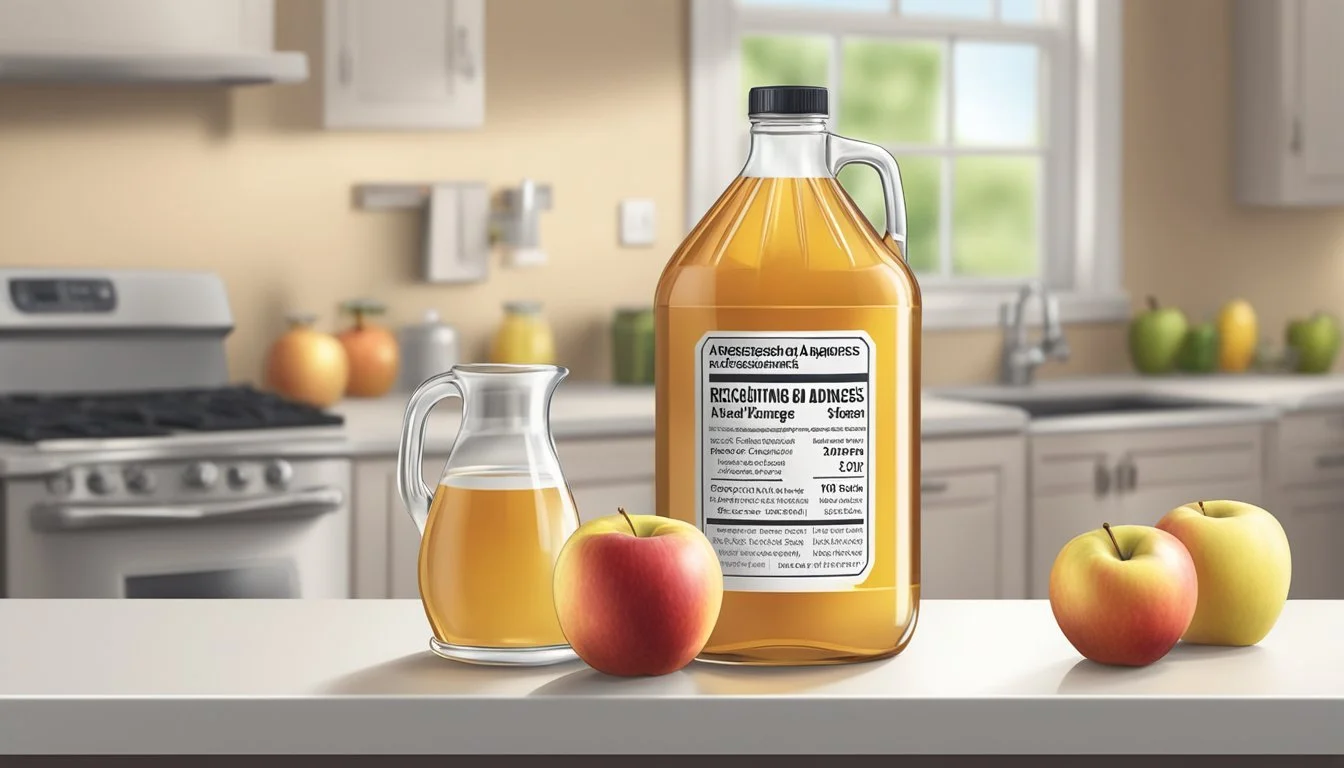Does Apple Cider Vinegar Go Bad?
Understanding Its Shelf Life
Apple cider vinegar, a staple in many kitchens, is renowned for its versatile uses ranging from cooking to natural remedies. Its high acidity and antimicrobial properties contribute to its reputation as a product that does not spoil easily. These characteristics ensure that apple cider vinegar maintains a long shelf life, with many sources agreeing that it remains safe and usable well beyond the date printed on the label.
Over time, changes may occur in the appearance, flavor, and quality of apple cider vinegar. These alterations, such as the development of sediment or a change in color, are typically harmless and do not necessarily indicate that the vinegar has gone bad. Proper storage, in a cool and dark environment, can help to preserve the quality of apple cider vinegar over time.
Despite its durable nature, it's important for consumers to know how to distinguish between natural changes in apple cider vinegar and signs that it might be time to replace the bottle. Clarity in understanding vinegar's shelf life and the factors that influence it empowers users to make informed decisions about the use and storage of this common household item.
Understanding Apple Cider Vinegar
Apple cider vinegar, a versatile ingredient, is praised for its acidic nature and antimicrobial properties. Understanding its composition, varieties, and culinary uses provides insight into why it is a staple in many kitchens.
Composition and Properties
Apple cider vinegar (ACV) is a result of the fermentation process of apple juice, where yeast initially turns the sugars into alcohol, and then acetic acid bacteria convert the alcohol into acetic acid. The presence of acetic acid rounds out the sharp, tangy flavor and attributes to its low pH, making ACV distinctively acidic. Often, ACV contains 'the mother', a combination of yeast and bacteria formed during fermentation that appears as cloudy filaments in the vinegar. This raw, unfiltered form of vinegar is believed to retain more enzymes and beneficial bacteria. ACV is also recognized for its antimicrobial properties, which can be attributed to its acidic nature.
Varieties of Apple Cider Vinegar
ACV comes in both pasteurized and unpasteurized forms. Pasteurized apple cider vinegar is heated and filtered, which removes 'the mother' and any sediment, giving it a clear appearance. Conversely, unpasteurized apple cider vinegar contains 'the mother' and may be labeled as raw or with mother. Some proponents of natural health remedies value raw, unfiltered ACV for its potential health benefits, although these claims often require more scientific backing.
Apple Cider Vinegar in Cooking
In the culinary world, ACV's application is incredibly varied. Its robust flavor enhances the taste of marinades and salad dressings, and it is a key ingredient in pickling. Its acidity can be utilized to add zest to beverages and balance the sweetness in baking recipes, while the enzymatic effect of ACV can also tenderize meats in marinades. Both its flavor and preservative qualities are assets in creating condiments and preserved foods.
Shelf Life and Spoilage
Understanding the shelf life and potential spoilage of apple cider vinegar (ACV) is key to maintaining its quality and ensuring food safety. This section explores the longevity of ACV and how to identify and prevent spoilage.
What Constitutes Spoilage?
Spoilage in apple cider vinegar can be identified by unexpected changes in color, texture, or odor. If the vinegar develops mold or an off-putting odor, or if the container hisses or fizzes upon opening, it may indicate bacterial or fungal contamination. Sediment at the bottom or a cloudy appearance is usually not a sign of spoilage but rather a natural occurrence due to fermentation and oxidation.
Factors Influencing Shelf Life
The shelf life of apple cider vinegar can be affected by:
Exposure to light: Direct sunlight can degrade quality.
Exposure to air: A tightly closed bottle prevents oxidation.
Storage methods: Proper storage preserves its longevity.
Maintaining a cool, dark place like a kitchen cabinet away from direct sunlight and ensuring the bottle is tightly closed are crucial to prevent spoilage.
Does Apple Cider Vinegar Expire?
ACV is highly acidic, creating an inhospitable environment for bacteria. This attribute means that apple cider vinegar never truly expires, and there's no strict expiration date. However, it's often marked with a "best before date" to indicate peak quality.
Storing Apple Cider Vinegar
Bottle: Store ACV in its original airtight container.
Location: Choose a cool and dark place, such as a pantry.
Refrigeration: Not required as it does not prolong shelf life.
Proper storage will maximize the shelf life, usually ranging from 2 to 5 years unopened, and about 1 to 2 years after opening.
Health and Safety Considerations
When discussing apple cider vinegar (ACV), safety and potential health benefits are paramount. Consumers often wonder about its shelf life and any associated health considerations, especially when using older bottles of vinegar.
Is Expired Apple Cider Vinegar Safe?
ACV's acidic nature and antibacterial properties contribute to its self-preserving quality, meaning it is typically safe to consume even after a long period. Despite changes in appearance like increased cloudiness or sediment at the bottom, these alterations do not signify spoilage. Consuming ACV that has changed in color or taste is generally considered safe; however, if one notices an off odor or signs of mold, it should be discarded.
Potential Health Benefits of Apple Cider Vinegar
Apple cider vinegar is recognized for a variety of potential health benefits. The acidic component of ACV can aid in digestion and help maintain blood sugar levels after meals. Furthermore, ACV can support weight loss efforts through its possible impact on appetite regulation. It is also a source of probiotics and fiber, although the nutritional value of ACV is relatively low due to the absence of significant vitamins and minerals. It is important for consumers to regard ACV as a supplement to a healthy diet rather than a singular health solution.
Using Vinegar in Other Applications
Apple cider vinegar's unique flavor profile and preservation qualities make it a versatile ingredient in many culinary applications, from recipes to substitute ingredients. Its acidic nature can enhance food preparations, offering both taste and functional benefits.
Versatility in Recipes
Apple cider vinegar is often the acid of choice in various recipes due to its distinct, slightly fruity flavor that complements other ingredients rather than overpowering them. It can be used in the following ways:
Salad dressings: Combining with oil, herbs, and seasonings to create vinaigrettes.
Marinades: Tenderizing meats while infusing them with flavor.
Pickling: Preserving vegetables while adding a tangy taste.
Substitute Ingredients
In cases where other acids are unavailable or unsuitable, apple cider vinegar can serve as a substitute ingredient. Here are some common substitutions:
Lemon juice: Equal parts apple cider vinegar can be used when lemon juice is required for its tanginess.
White vinegar: For a milder flavor, dilute apple cider vinegar with water when replacing stronger white vinegar.
Rice or champagne vinegar: These milder vinegars can be substituted with apple cider vinegar in smaller quantities to avoid overpowering the dish.
Recognizing and Addressing Changes
When considering the longevity of apple cider vinegar (ACV), it's essential to note that while it doesn’t spoil in the traditional sense, ACV can undergo physical and flavor changes over time. Consumers should be aware of these transformations to ensure optimal use.
Physical and Flavor Changes
Physical Changes: Apple cider vinegar is a product known for its durability. Over time, it might exhibit changes in appearance, such as becoming cloudier or developing sediment. This is due to the mother of vinegar, a natural substance formed during the fermented process that can continue to change slightly. The mother is harmless and can be filtered out if desired.
Flavor Changes:
Taste: Despite these visual changes, the acidic nature of apple cider vinegar typically preserves its flavor. However, subtle shifts in taste may occur, which usually don't indicate spoilage but rather natural age-related changes.
Consumer Reviews and Experiences
Consumer feedback can be valuable in understanding the lifecycle of apple cider vinegar. Reviews indicate that many people use ACV well beyond the expiration date without detrimental effects on taste or flavor. While individual experiences may vary, the consensus affirms that if stored properly, apple cider vinegar remains safe to consume despite these aging signs.
It is encouraged that users trust their senses to determine ACV’s condition. If the smell and taste are acceptable, it’s generally considered safe for use.




